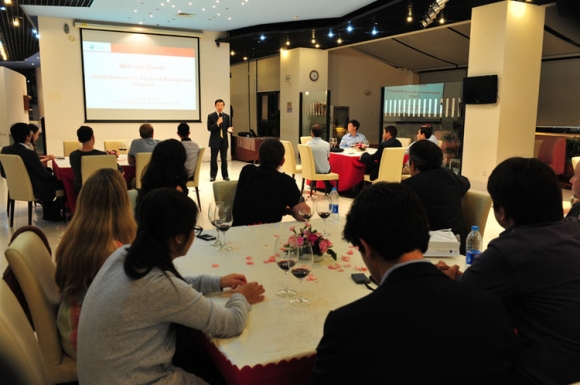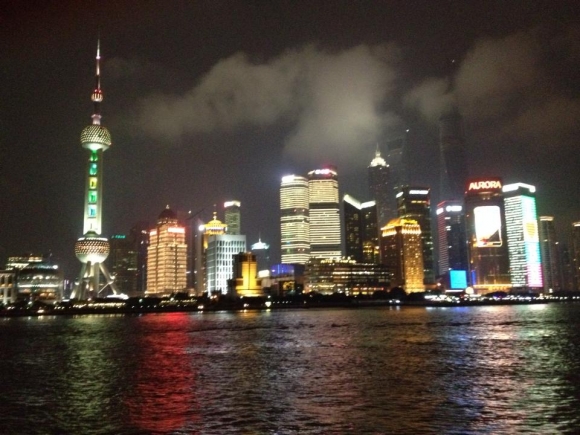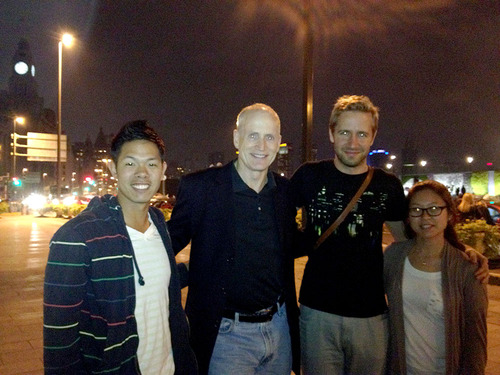GNW2013 in Shanghai
The past week I had the opportunity to go to Shanghai, China, and am frankly still suffering a bit from the remnants of jetlag from the long flight back to New Haven, CT, so apologies for the delay as I had every intention of writing this post from China. Being of Chinese decent, but never having the opportunity to travel back to my “homeland,” I was really looking forward to my first visit to China. As part of Global Network Week 2013, I traveled with four of my Yale SOM classmates, along with twelve other business school students from EGADE (Mexico), IE (Spain), and Technion (Israel), to Fudan University in Shanghai to learn more about doing business in China firsthand.

The trip combined discussion, case studies, company visits, and cultural excursions that helped me explore the multi-faceted nature of doing business in China. Our classes usually commenced at 9am, which was a short walk from our hotel, so we were able to grab some classic street food (warm soybean milk, pork and vegetable buns, and a boiled tea-egg) before arriving to Fudan. Each day covered two topical lectures and discussions. The topics ranged from the history and cultural foundations of China’s evolution to social media, entrepreneurship, and economic development. However, we also were able to visit Lenovo and Bosch operations in China to see some of the opportunities and challenges that both Chinese and foreign companies faced operating in China.

China’s growth can be attributed to three main factors including: 1) exports, 2) rising consumer base, and 3) globalization. This growth has not only helped China rise fast, but has also resulted in a high cost to the environment (pollution more predominant in Beijing and factory cities), labor shortages, and an increasing need to move up the value chain (from original equipment manufacturing to original design manufacturing to now original brand manufacturing). We saw this firsthand during our conversations with Lenovo and their earlier acquisition of IBM’s PC division in 2005 as a way to increase their branding as well as move up the value chain toward design. We also had critical discussions exploring topics around innovation, social media censorship, and China’s need to become a knowledge economy to avoid the middle income trap. How China will tackle the challenge of moving from resource-driven growth, dependent on cheap labor and capital, to growth based on high productivity and innovation is still up for debate, but it requires investments in at least infrastructure and education.
 Outside of the topical discussions, we also were able to meet some fantastic Global Network of Advanced Management students from countries including Brazil, Israel, Mexico, Peru, Spain, and Switzerland to name a few and explore Shanghai together. Shanghai is a bustling modern city that is constantly changing with new malls, restaurants, nightclubs, and venues with an interesting mix of traditional Chinese culture and modern Western culture.
Outside of the topical discussions, we also were able to meet some fantastic Global Network of Advanced Management students from countries including Brazil, Israel, Mexico, Peru, Spain, and Switzerland to name a few and explore Shanghai together. Shanghai is a bustling modern city that is constantly changing with new malls, restaurants, nightclubs, and venues with an interesting mix of traditional Chinese culture and modern Western culture.
Some scenic sights included (pictures below):
- Famous Bund, where we actually ran into Dean Snyder
- Oriental Pearl Tower
- Yu Yuan Gardens
- French Concession
- Shanghai Museum
- Xintiandi
- Suzhou Gardens

